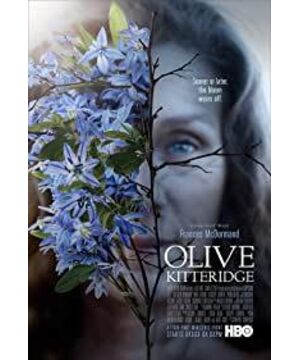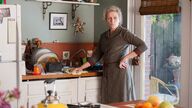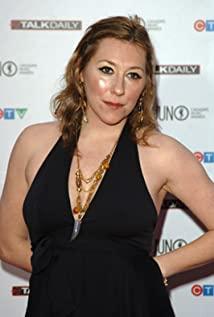The heroine of the story, Olive Kitteridge, gave me the feeling that it was a super-contradictory complex. On the one hand, she yearns for or yearns for love (after all, not everyone has the energy to have extramarital affairs, and not everyone has the courage to ask the person they like for dinner), on the other hand, she ignores the flowers and cards that symbolize love (give her husband her Throwing the Valentine's Day card in the trash can, she has no enthusiasm for flowers, and is even unwilling to express a little joy); on the one hand, she cares for people and expects to be cared for, but on the other hand, she coldly refuses people thousands of miles away. When someone wanted to chat with her on the plane, she said I was going to continue looking at the scenery; when someone offered her help and comfort, she would rather offend people with some one-liners than let down her guard against others. I can't agree with the part about family and son. He clearly loves his son, but leaves hurt everywhere. Even if the grown son does not do enough, in the final analysis, I have to say that this mother is a failure.
Of course, the characters in the play are always slightly exaggerated. Olive's various inappropriate and even staggering performances bring psychological and emotional shocks to the audience, and the pain and resonance caused are more likely to make people alert. Find your hidden problems.
I haven't read the original book, and I don't know the real background and motivation of the literary creation. But I think the author's description of olive must not only describe the second half of a middle-aged woman's life. olive should represent a kind of person, a kind of person who is insecure and keeps his heart closed. She would rather stand on the sidelines of life than open her heart to love or be hurt. Whether she is right or wrong, Beauty or Ugly would rather stick to her own aesthetics and ideas (like the dress at the wedding), rather than let go of a little bit of self-esteem and pride, to listen, to integrate, and to revise her own values and worldview. In the face of the world's setbacks, at most she expresses her anger furtively (throwing away Susan's shoes and drawing dirty white sweaters in Susan's wardrobe with crayons), but she is unwilling to compromise and bow her head and say that I may be wrong, then I will change Get dressed. She was too self-righteous and took herself too seriously. Being so arrogant and extremely insecure, she was afraid of being rejected by others because she cared about the world's vision, so she simply refused to take others seriously, and she simply kept an air of indifference. However, after all, she could not be separated from the values of this society. Even if the world frustrated her, she still could not be separated from the world.
I still habitually want to draw a little bit of educational significance from it (the problem of leaving notes in high school). I think it's important to learn to open your heart. Slowly learn to be tolerant and open-minded. Be more tolerant of yourself and others’ mistakes and deficiencies, don’t care too much about taking a loss or being laughed at, and don’t care too much about being used or hurt; be more open-minded, don’t always look arrogant and cold, let go of yourself Let go of your vigilance and face the good and the bad bravely.
If you hold your hands tightly, you will only collide with the world; if you open your arms, it is possible to embrace the world warmly.
View more about Olive Kitteridge reviews











